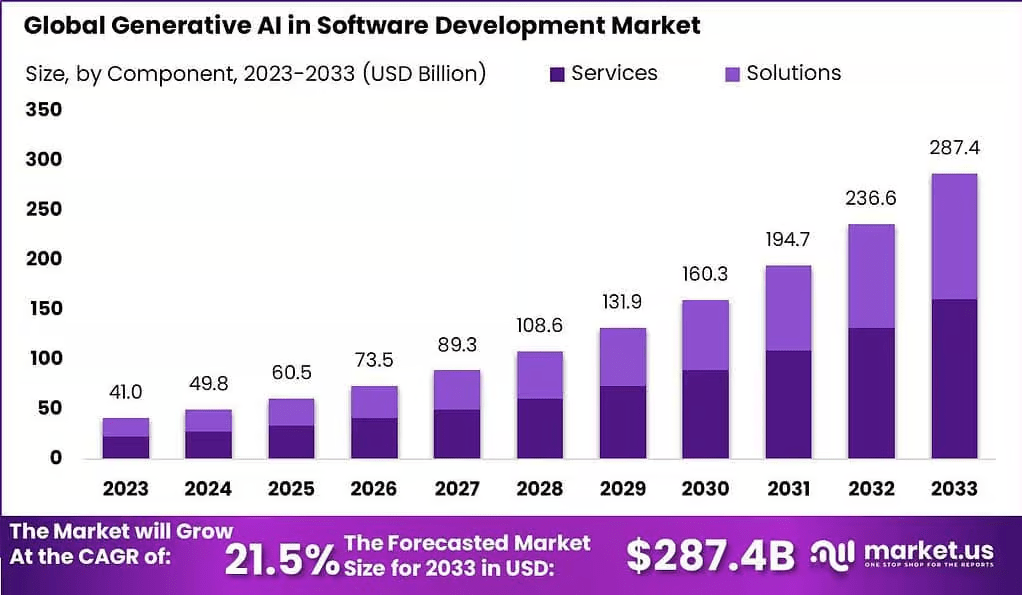Introduction
The Generative AI in Software Development Market is ushering in a new era where artificial intelligence not only supports but actively generates code, designs system architecture, and enhances developer productivity. By leveraging models trained on vast codebases, generative AI enables automated coding, bug detection, testing, documentation, and even code translation across languages. This revolution is not just optimizing development cycles—it is redefining how software is conceived, built, and maintained. As businesses face pressure to deliver faster, cheaper, and more reliable software, generative AI is becoming a core enabler of agile, scalable development.

Key Takeaways
Generative AI is accelerating software development by reducing manual effort, lowering costs, and enabling faster time-to-market. Developers are increasingly using AI tools for code suggestions, auto-completion, refactoring, and real-time debugging. Key trends include the rise of AI pair programming, integration of AI in DevOps pipelines, and the democratization of coding for non-technical users through low-code and no-code platforms. Enterprises are adopting these tools to improve productivity and bridge skill gaps, while startups and open-source communities are driving rapid innovation. Ethical coding, IP ownership, and AI transparency are emerging as key concerns.
Component Analysis
Core components in this market include code generation models (LLMs), natural language processing (NLP) engines, automated testing tools, code analysis and refactoring tools, and collaborative coding platforms. Large Language Models (LLMs) like those behind GitHub Copilot or ChatGPT serve as the backbone for code generation and documentation. NLP engines convert human input into syntactically and semantically correct code. Automated testing and refactoring tools streamline QA and performance optimization, while integrated development environments (IDEs) and version control systems integrate AI assistance into daily workflows, reducing errors and enhancing code quality.
Service Analysis
Key services in the generative AI for software development ecosystem include AI-assisted coding platforms, AI-driven testing and QA, project management and task automation, documentation generation, and custom AI model training for enterprise use cases. SaaS platforms now offer plug-and-play AI coding assistants within IDEs, while larger enterprises are leveraging fine-tuned AI models for domain-specific coding tasks. AI also enables intelligent backlog grooming, sprint planning, and real-time collaboration. As AI adoption grows, consulting and integration services are in high demand to help organizations securely and effectively deploy generative AI across their SDLC (Software Development Life Cycle).
Key Player Analysis
Leading players in the generative AI software development market include GitHub (Copilot by Microsoft), OpenAI, Google (Codey and Gemini), Amazon (CodeWhisperer), IBM, Tabnine, Sourcegraph, and Replit. GitHub Copilot, powered by OpenAI, leads the pack in AI pair programming, deeply embedded in the developer ecosystem. Google and Amazon are integrating generative AI into their cloud-based coding tools, offering multilingual support and cloud deployment optimization. IBM focuses on enterprise-grade AI development tools with governance features, while Replit and Tabnine empower individuals and startups with in-browser coding assistance. These players are investing in model transparency, developer UX, and secure code generation.
Top Market Leaders
- Microsoft
- IBM
- OpenAI
- DeepMind
- Amazon Web Services (AWS)
- Alibaba Cloud
- GitHub Copilot
- Hugging Face
- Codota
- SourceAI
- AI21 Labs
Conclusion
Generative AI is revolutionizing the software development landscape, offering unprecedented speed, collaboration, and intelligence in coding processes. As organizations strive to meet growing digital demands, this technology is becoming integral to competitive advantage, enabling developers to focus on innovation while AI handles the heavy lifting. With responsible deployment and continuous innovation, generative AI is set to become the backbone of modern software engineering.
The macro analyst desk brings highly sought after financial news based on market analysis, insider news and company filings.
